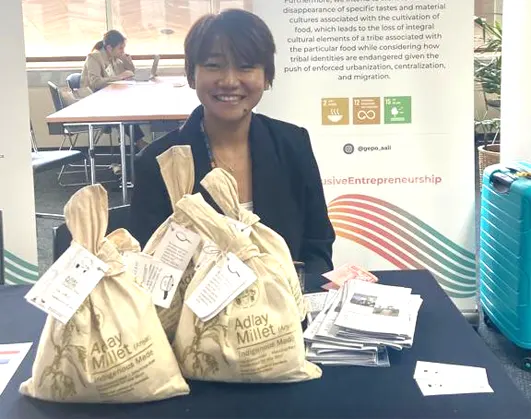[ Karyir Riba ]
ROING, 20 Aug: Dambuk (Lower Dibang Valley)-based startup Gepo Aali represented India at the Youth Co: Lab Summit-2023, an initiative of the United Nations Development Programme and Citi Foundation, in Bangkok, Thailand.
An initiative of young entrepreneur Dimum Pertin, the startup stood out as the winner of the Youth Co: Lab 2022-’23, themed ‘Developing FinTech solutions focused on biodiversity conservation’, held in India, in which more than 400 people from all over the country participated.
Among the 12 winners under six themes, Pertin was chosen to represent the country in Thailand, where more than 26 countries participated, in July 2023.
Speaking about the startup, the 30-year-old entrepreneur with an engineering degree (masters in development studies and diploma in agroecology) said, “Gepo Aali works in collaboration with local farmers and groups to preserve the tribal identities and natural ecosystem, reviving specific tastes and lost cultural practices, one crop at a time.
“In its first year, we started our work with a millet variety called adlay millet, or anyat in Adi. The adlay is one of the most underutilised millet varieties, with only a few farmers still cultivating it in some parts of Upper Siang district.
A crop that once used to be a staple for the Adis has been totally replaced after the coming of rice and the Green Revolution.
“With Gepo Aali’s intervention, this year, a group of 50 women farmers are starting to grow the crop in the Dambuk-Bomjir region, where there are barely any traces of cultivation,” she said, and added that “adlay millet holds rich ancestral value – the only reason why a few still hold on to the millet.”
“Gepo Aali is derived from the Adi language, and translates to ‘the seed of comfort’, where Gepo means comfort and Aali means the seed preserved for future cultivation (not sapling). The English vocabulary lacks such articulation, which is also why Gepo Aali is working in the intersection of food and language. I also realised that a food crop also plays an important role in the linguistics nuances; the terms used in the process of making and growing the particular crop gets heavily compromised,” said Pertin.
She informed that her product has received an overwhelming response from the locals and was sold out in a day after being launched as its MVP in the first week of July. “We also took some along with us to the summit in Bangkok, and it was accepted with a lot of warmth and appreciation. In the coming year, our product will hopefully travel across other Indian states, and will be available across departmental stores as well as online,” she said.
Pertin said that the concept of starting Gepo Aali was inspired by her grandmother.
“My grandmother, as she reached her octogenarian age, started craving for certain food items which she used to consume while growing up, and this particular millet, adlay millet, was a major craving, which also led me to work with this crop as our first product,” she said.
“To bring together the 50 women, I collaborated with the Arunachal Pradesh Rural Livelihoods Mission and organised workshops to bring awareness on the importance of the indigenous variant of food crops and distributed free seeds to them, which would be further procured from them, and packaged and sold by Gepo Aali.
“Since this millet holds rich ancestral value, there is a sense of nostalgia attached to the crop, which is also why the number increased from three farmers to 50,” she added.
The Gepo Aali adlay millet is priced at Rs 210 per kilogram.
“Firstly, our product is indigenous to India, while most rice substitutes, like quinoa, are not. The product is very similar to rice in terms of cooking and taste. With high micronutrients and dietary fibre, the product beats other competitors in the market. This millet also has low GI index, which makes it a good option for people suffering from diabetes, as well.
“Another USP of our product is that we make sure to hand-pound our product and not use machines for the purpose, in order to not compromise on the nutrient content. The hand-pounding tool has been an integral part of the food-making process among tribal communities. Our product is also packed in handmade eco-friendly bags,” said Pertin.




